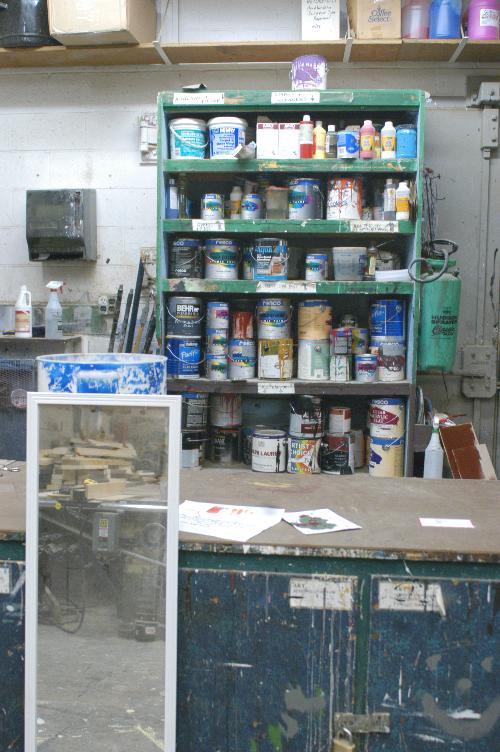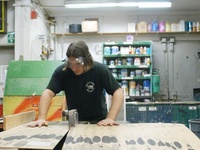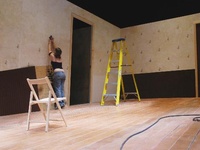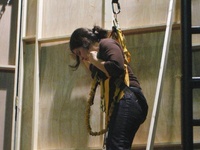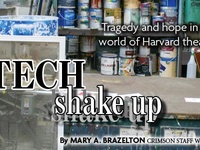This fall, some of the biggest drama on campus is happening in the sound-booths and catwalks of the Harvard theater scene.
Technical theater crews are, in large part, defined by their invisibility—they build the sets and design the lighting for all plays at Harvard, but the crew members themselves never appear in the shows they work so hard to produce.
Yet this fall, Harvard’s theater tech community is experiencing tumult worthy of a Greek drama, and how they meet the ensuing challenges of these transformations will have a lasting effect on theater at Harvard, both off stage and on.
LOSING A FRIEND
The Harvard tech community suffered its deepest shock in recent years with the death of a man whose name is unknown to many on the campus, but who was a bulwark of Harvard theater: longtime Technical Director of Harvard College Theatre Programs Alan P. Symonds ’69.
Symonds was not only the primary liaison between the student-run Harvard-Radcliffe Dramatic Club (HRDC) and the administrative Office for the Arts at Harvard (OFA), he was also a technical guru and mentor for techies at Harvard.
His passing in June, due to a heart attack, was unexpected and upsetting to many students involved in theater.
“It’s a devastating loss,” says John T. Drake ’06, former president of the HRDC and current Campus Life Fellow.
“What I remember most of Alan is the respect he gave the students, a rare thing between a boss in his late fifties and a frosh who’d just shown up,” says Benjamin T. Clark ’09, a sophomore techie.
“He was a close friend to basically everyone who was interested in tech on campus,” Blase E. Ur ’07, the current president of the HRDC, writes in an e-mail.
Logistically, Symonds’ death created a crisis for the OFA, which faced the almost insurmountable task of replacing a legendary figure on campus.
The fact that the OFA is currently in the middle of the construction and transition to the New College Theatre—in the performance space of Hasty Pudding Theatricals on Holyoke Street—has only complicated the situation.
“They would have to get a couple of people to replace Alan,” says Drake.
Apparently, the OFA has done just that. Three people have assumed positions as the official Harvard contacts with the HRDC.
J. Michael Griggs, a lecturer in dramatic arts in the Department of Visual and Environmental Studies, will continue as the primary OFA liaison for HRDC shows at the Loeb Theatre.
[CORRECTION APPENDED. See below.]
Elizabeth Dean, Assistant Technical Director for College Theatre Programs, is currently taking on Symonds’ role as the College liaison for the shows being produced in the nearby Agassiz Theater.
To assist and oversee that work, last Wednesday the OFA named Thomas Morgan as the Interim Technical Director for College Theatre Programs.
But the role that Morgan will adopt remains unclear.
“He was hired as the Interim Director—his job is only for this year,” says Griggs. “When the New College Theatre opens, there may be a new search.”
BIG SHOES TO FILL
No matter what their qualifications, Symonds’ replacements face a legacy that’s difficult to live up to, metaphorically and literally.
Symonds’ expertise stretched back decades—and even his equipment has experience replacements couldn’t match.
“Liz [Dean] was cleaning out the Agassiz, and she’s found the spotlight that was used at the very first Woodstock,” says Nicholas J. Shearer ’09.
Additionally, Symonds created and directed the now-institutional Freshman Arts Program (FAP), a special orientation week program for first-years interested in the arts.
The program consistently attracts students who go on to take leading positions in the HRDC and other arts organizations on campus. Although Drake took over the administration of FAP this September, a permanent director has yet to be announced.
Within the HRDC, techies are doing their best to take up Symonds’ mantle. In terms of the day-to-day operations of building and maintaining sets, the crews continue their work largely as they have in the past.
In terms of expert advice and resources to draw on in times of crisis, however, a dangerous gap remains.
“Alan was instrumental to the community’s functioning,” says Drake. “He would really push people to do their best work. He knew pretty much everything about everything, and it’s a huge loss to not have him around.”
“Alan was very involved both in an administrative role as well as ‘in the trenches,’” adds Ur. “He was great about coming to see our designs, helping us with ideas, or teaching us.”
“He was our go-to person for any and all questions,” says Casey M. Lurtz ’07, president of the Board of Directors for the Harvard-Radcliffe Gilbert and Sullivan Players and another prominent figure in Harvard theater.
“Somehow, we’ve managed to cobble together most of the information that he knew, but it’s all spread out now,” she says.
Such comprehensive oversight is perhaps the biggest loss the tech crew has faced in the wake of Symonds’ death.
CRISIS AT THE HELM
As if that loss wasn’t enough, HRDC experienced another shock in the tech world earlier this month. It was of lesser immediate impact, but its consequences could be significant for the future of Harvard tech.
Two weeks ago, David S. Jewett ’08, the Tech Liaison on the HRDC’s Executive Board, resigned from his position, citing personal problems with the board and his role in the theater community.
Jewett explains his decision to leave the board in an e-mail: “I believe that when one is involved in an activity one must either gain fulfillment or tangible gain; I didn’t feel like I was getting either from being on the board.”
He declines to further comment on his motivations.
Jewett will remain on the tech crew of the Gilbert & Sullivan Players’ production of “H.M.S. Pinafore” and will be in the chorus of the show. “We’re the one theater thing that he stuck to, apparently,” says Lurtz, laughing.
Lurtz says of Jewett’s resignation that “[The HRDC position] wasn’t doing for his life what he thought it should be doing, and he didn’t think he was able to dedicate enough time to it.”
The HRDC will hold its regularly-scheduled board elections in just over a month, making the transition to a new Tech Director somewhat smoother.
“I don’t think it’s going to be a terrible void to fill,” says Drake of Jewett’s resignation. “It’s definitely a critical time for the HRDC…But the HRDC’s had two people step up as interim liaisons, and they’re both wonderfully qualified guys.”
The two replacements are Shearer and Clark, both underclassmen. They remain optimistic about the direction of tech on campus.
“The New College Theatre will open next year, so it’s going to be a pretty big period of change anyway,” says Shearer of his own long-term vision for Harvard tech. “It’s going to bring, hopefully, a lot more people who will see how great technical theater work is.”
Shearer also cites recent initiatives to recruit more first-years to HRDC tech.
“Now we run technical workshops, technical orientations. We’ve been more proactive,” he says. He also hopes to see an increased collaboration with the tech crews of other theatrical groups at Harvard, like the Hasty Pudding Theatricals.
“Hopefully, we can bring the tech community together,” he says.
Clark echoed Shearer’s desire to focus on enlisting new freshmen. “The massive walls of ‘Slavs!,’ the giant MRI of ‘Knock,’ the half-suspended set of ‘Alcestis,’ all was completed by one or two Technical Directors,” he writes in an e-mail, referencing previous HRDC productions.
“Now imagine what three or four more technicians per show could accomplish,” he writes.
BUILDING A FUTURE?
It’s not just the energy of these two sophomores that has some thespians and techies optimistic about the future of tech at Harvard.
Techies have been increasingly well represented on the board of the HRDC. Ur, the current president of the HRDC, never acted in a play during his time at Harvard and has been exclusively a member of the tech crew. Drake was also heavily involved in tech before his stint as president.
Ur has done technical work on nearly every show produced in the Loeb or Agassiz since his first semester here—something even the most accomplished actors on campus do not attempt.
“Sleep is kind of something I don’t get enough of,” he writes in an e-mail. “[Tech is] fun enough to make up for it, though.”
A week before the opening of “The Marriage of Bette and Boo”—the first play of the Loeb Mainstage season—Ur was hard at work on assembly of the set. This is not a usual place to find an HRDC president, and not a typical idea of “fun” on a sunny Friday afternoon.
Yet in the harsh lights of a theatre under construction, with saws and staple-guns buzzing in the background and sawdust covering the floor, Ur seemed fully at home. “We’re building a forced-perspective stage,” he says enthusiastically of the set, gesturing to a geometrically confusing structure rising behind him.
Ur’s attitude towards the differences between actors and techies, the butt of many jokes within the theater world, reflects a unifying approach: “Anyone who comes to help out (with a show) is part of the family, whether they also act or only like building stuff,” he writes.
A longtime HRDC policy requires all actors to do tech for at least one other show in a given season, reinforcing that inclusiveness.
A series of tech workshops within the HRDC—given at the beginning of each semester and started by Ur several semesters ago—suggests a renewed focus on technical theater within the HRDC over the past few years, one that counters its recent administrative losses.
“We should think of this as a clean slate,” Shearer says. “We can perhaps use [this time] as a chance to try something different, something new.”
In the sound booth for “Bette and Boo,” surrounded by rolls of electrical tape and a stack of sound-effect tapes that reaches to the ceiling, Ur is taking Shearer’s words literally.
“We’re trying to build this Frankenstein phone,” Ur explains, grinning, as he makes plans to construct an elaborate prop.
“Tech at Harvard is great in that we consistently have high production values across campus,” Ur writes in an e-mail. “People come up with a lot of really creative sets, and then they always make them happen. It’s exciting.”
Asked about his view of the future of tech at Harvard, Shearer says “it’s a very optimistic one—maybe with some surprises along the way.”
—Staff writer Mary A. Brazelton can be reached at mbrazelt@fas.harvard.edu.
CORRECTION
In the Oct. 20 article "Tech Shakeup," J. Michael Griggs was incorrectly identified as a lecturer on dramatic arts in the department of Visual
and Environmental Studies and as an Office for the Arts liaison for Harvard-Radcliffe Dramatic Club shows at the Loeb Theatre. In fact, Griggs is a lecturer on dramatic arts with the Committee on Dramatics and is the
technical director of the Loeb Theatre for the American Repetory Theatre.
The Crimson regrets the error.
Read more in Arts
'In the Blood' Provokes Thought








